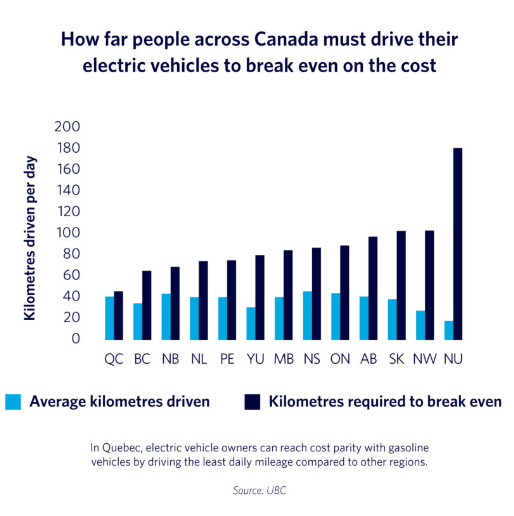This is why an electric vehicle will cost you more in Ontario than other provinces
Drivers in Ontario looking to switch gears to an electric vehicle may consider hitting the brakes on the idea following the release of a new report on the cost of ownership.
The University of British Columbia study found that it’s actually cheaper to own an EV than an internal combustion engine vehicle (ICEV) in some parts of the country, and Ontario is far from the top of the list.
Factors considered in the study included tax rebates and tax rates for EVs, charging costs, typical distance households travel in a region and electricity costs.
The Hyundai Kona was used as the guinea pig for the research, both the gasoline and electric models, and the cost benefits were weighted against the average Canadian auto ownership period of seven years.
The research found that in Ontario, it would cost about $11,000 more to own an EV in that seven-year time frame.
“They’re more expensive up front, but they’re cheaper to run, so it kind of becomes a question of where does the math actually add up,” Bassam Javed, one of the researchers, told CTV News Vancouver in an interview earlier this week. “The more you drive an electric vehicle, the more electric mileage you have so to speak, the more savings you actually accrue over time.”
According to the study, in order for an EV to make as much economical sense as a traditional gasoline car in Ontario, motorists would need to drive at least 88 kilometres a day to achieve cost parity – more than double the distance drivers in the province typically travel.
Among the 10 provinces and three territories, Quebec was ranked as the cheapest place to own an EV due to what the researchers identified as high purchase subsidies and low electricity prices.
“In Quebec, an electric car owner must travel at least 46 kilometres per day to come out ahead in comparison with owning a traditional car,” Javed said in a brief about the study.
The study ranks Ontario as the ninth-best place to own an EV in large part due to electricity and gas prices as well as new vehicle sales tax rates.
However, the biggest factor standing in the way of cost effective EV ownership in Ontario is a lack of rebates.

“The key reason why Ontario is less favourable for EVs than some of the other provinces is the absence of provincial rebates,” Javed said in an email to CTV News Toronto.
Currently, the only EV rebate available to Ontarians is the up to $5,000 provided through the federal government’s iZEV program. Back in 2018, Premier Doug Ford cancelled Ontario’s previous $14,000 EV rebate and claimed the money “only benefitted very wealthy people.”
Nunavut was ranked as the least optimal place in Canada to own an EV, where drivers would need to travel 180 kilometres a day for the switch to make sense.
The study noted that smaller EVs can produce greater cost benefits across the board, compared to bigger luxury electric cars. But with Canada set to phase out emission-producing vehicles by 2035, the researchers say the federal government will need to do more to reduce the cost barriers associated with driving an EV before then.
“Canada needs to take many paths towards clean and affordable transportation for all, which means not only supporting transitions to EVs, but also public transit and active transport,” UBC professor and study co-author Amanda Giang said in a brief.
View original article here Source









